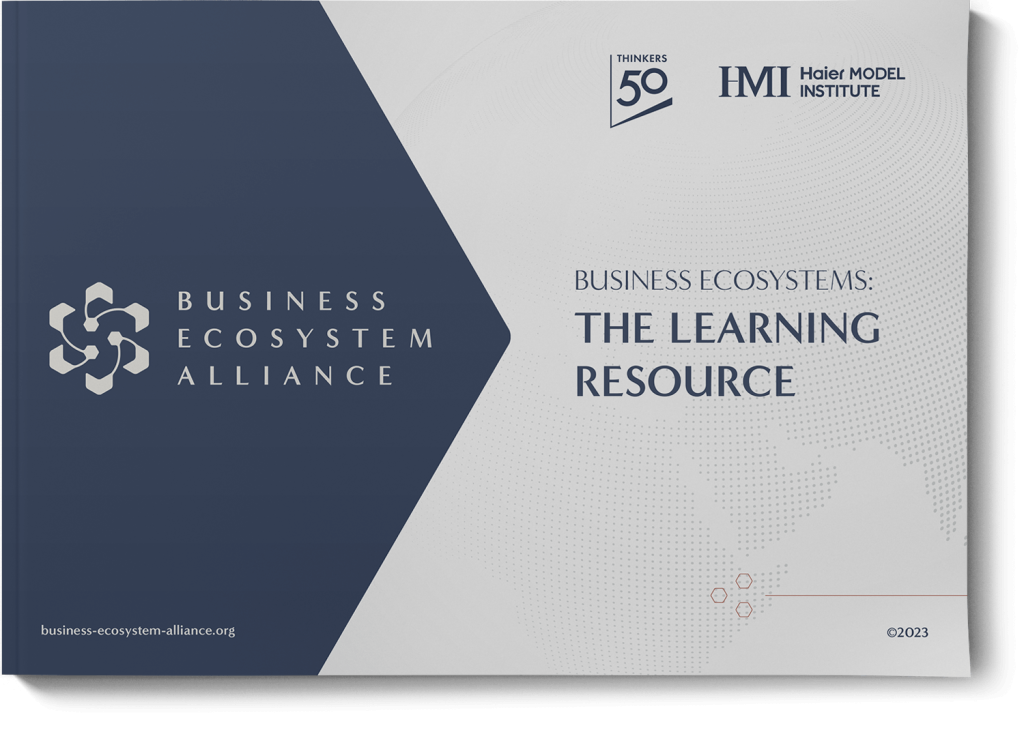Ecosystems for Ecosystems
In spite of significant efforts toward the mitigation of climate change through Net Zero targets for individual governments and companies, overall progress has been insufficient to shift the trend of emissions. This is at least in part because a complex collective action problem cannot logically be solved by only addressing it at the level of each agent. Today, there is insufficient coordination across nations and companies.
Digital ecosystems of the sort which have become widespread in business in recent years have, we believe, the potential to enable more ambitious and effective climate action. Instead of having to coordinate across thousands of enterprises globally, action by a handful of powerful orchestrators can have outsized effects because it can directly shape the decisions of their ecosystems’ contributors.
Consider the case of Amazon, which according to Marketplace Pulse has approximately 1.5 million active sellers. Any norms or standards Amazon chooses to adopt as orchestrator of the global retail ecosystem that runs on its digital platform could shape the behaviors of hundreds of thousands of businesses globally. And the same holds for other orchestrators. When dealing with a problem at the scale of climate change, such drastic reduction in the number of key players whose decisions can be pivotal amounts to a transformation of the ‘game,’ turning a virtually impossible consensus gentium into the feasible adoption of shared norms and practices by a few, disproportionately powerful actors.
One important virtue of business ecosystems is the sheer diversity of contributors who can come to act collectively through the influence of orchestrators. More specifically, ecosystems reach large numbers of small- and medium-sized enterprises — those that are less likely to make public net-zero pledges or indeed take any unilateral climate action. Yet the ‘long tail’ of small and medium enterprises (SMEs) all over the world is critical to truly addressing climate change collectively, as SMEs account for 90% of all businesses, 50% of employment, and over 40% of GDP globally.
In a sense, ecosystems can realize the idea of “climate clubs” proposed by Nobel Laureate William D. Nordhaus. Collective action around climate change is especially difficult because of the free-rider problem: those who undertake costly mitigating action create benefits from which no one can be excluded, and so those who do nothing can ride for free. To solve the free-rider problem, Nordhaus has proposed that countries should create “club regions” such that “the ‘dues’ to the club are expensive [emissions] abatement, while the ‘penalties’ for non-membership are tariffs on exports to the club region.” Business ecosystems could do something very similar, especially when they rely on digital platforms. Access to the platform can be immensely beneficial to individual businesses, but orchestrators could make it the case that contributors ‘pay their dues’ in terms of adherence to rigorous environmental norms, while exclusion from or higher cost of access to the platform could function as ‘penalties’ for non-members. Orchestrators have the power to replicate in the business world the collective action dynamics of what Nordhaus has described as “the best hope for effective coordination” to contain global warming.
Business ecosystems also have another important qualifying characteristic: the ability to unlock experimentation and innovation towards new solutions. An important aspect of the climate challenge problem is that we do not currently know all of the eventual solutions but rather need to iterate our way towards them. Climate change is as much a challenge of innovation as of execution. Any governance mechanism, therefore, needs to be evolvable in nature. Individual ecosystems can deploy their modular structures to explore, adapt, and iterate on solutions; through digital platforms, learning can be fast and easily spread around for contributor networks to continuously rebalance their approaches to a common problem. As multiple ecosystems do the same, there is the additional benefit of multiple, parallel experimentation.
Furthermore, the robust digital technologies that power most of today’s largest ecosystems can go a long way towards filling the complex ‘scorekeeping gap’ of environmental mitigation. As noted above, today’s net-zero pledges are virtually impossible to evaluate and compare, in part because there are no robust standards on the scope and metrics for emission reduction plans and no continuous flow of consistent data. Digital tools can make the difference in terms of setting clear standards, aggregating progress data, and thereby presenting an accurate picture of progress that also creates transparency over and within an ecosystem.
Moreover, the time is in some ways ripe for such a move.
The regulatory pressure on digital ecosystem orchestrators is part of a broader challenge to the legitimacy of globalization and technology. Between 2010 and 2019 the share of Americans who believed that tech companies had a positive impact on society decreased from 68% to 50%. While citizens continue to hold technology companies in high regard, their trust and respect appear to be slipping.
In this context, turning ecosystems into active instruments for climate action can be a powerful reaffirmation of corporate purpose in line with societal expectations and goals. Moreover, technology can here be robustly deployed for good, making sustainability pledges a commitment tangible and measurable for thousands of enterprises. Orchestrators can draw on what they already know how to do –build and sustain business ecosystems — to make a substantial contribution in the effort to combat climate change, thereby renewing their ‘social license to operate’.
This article is a summary of our previous article “Ecosystems for Ecosystems”. You can find the full-length piece here on the BCG Henderson Institute website.
Martin Reeves is a Managing Director and Senior Partner in BCG’s San Francisco office and Chairman of the BCG Henderson Institute, BCG’s vehicle for exploring ideas from beyond the world of business, which have implications for business strategy management. Martin is the co-author of The Imagination Machine (HBR Press, 2021), Your Strategy Needs a Strategy (HBR Press, 2015), and the Inspiring the Next Game series (DeGruyter 2021).
To connect with Martin, please follow him on LinkedIn or Twitter @MartinKReeves
Andrea Lupini is a Consultant in the Detroit office of Boston Consulting Group and an Ambassador at the BCG Henderson Institute


